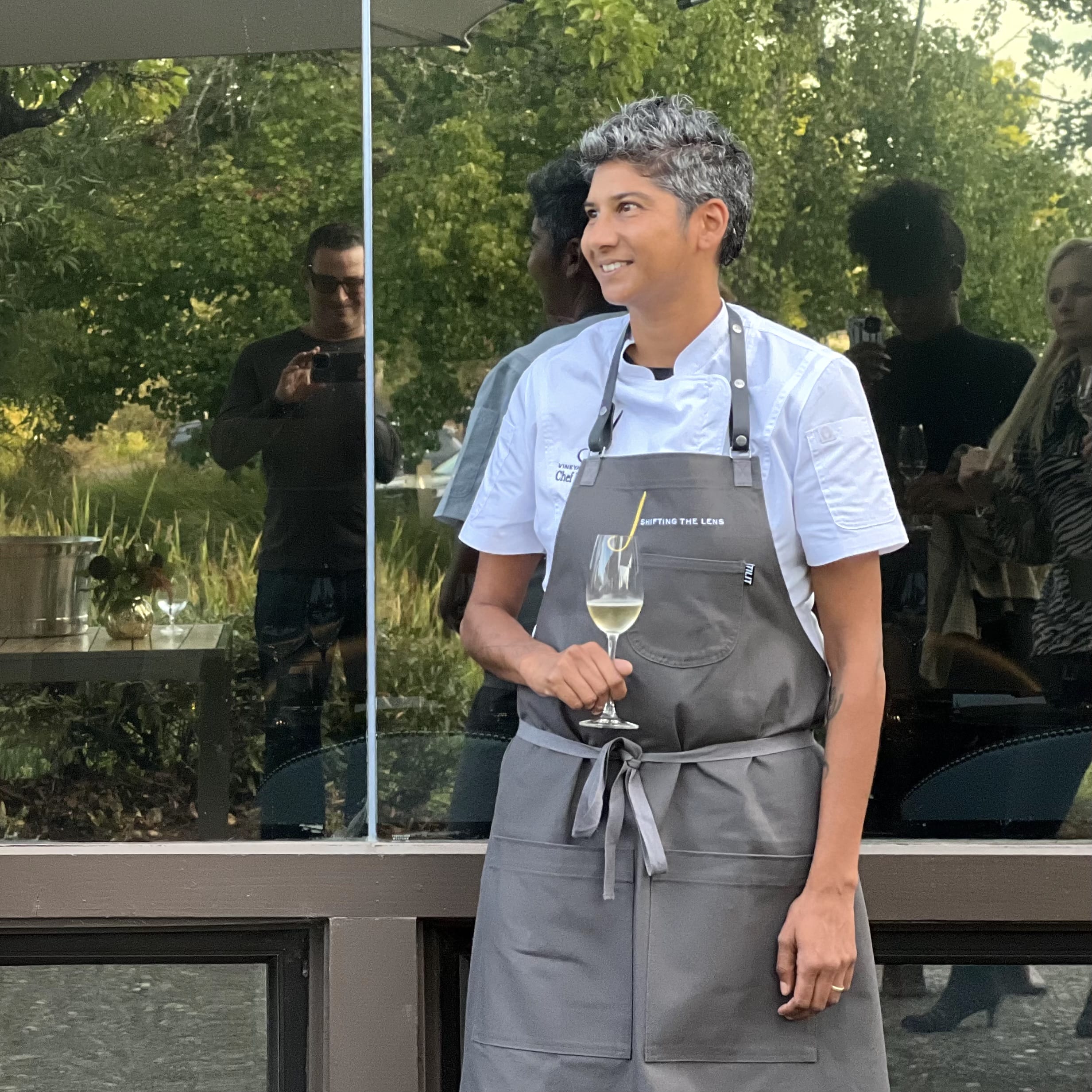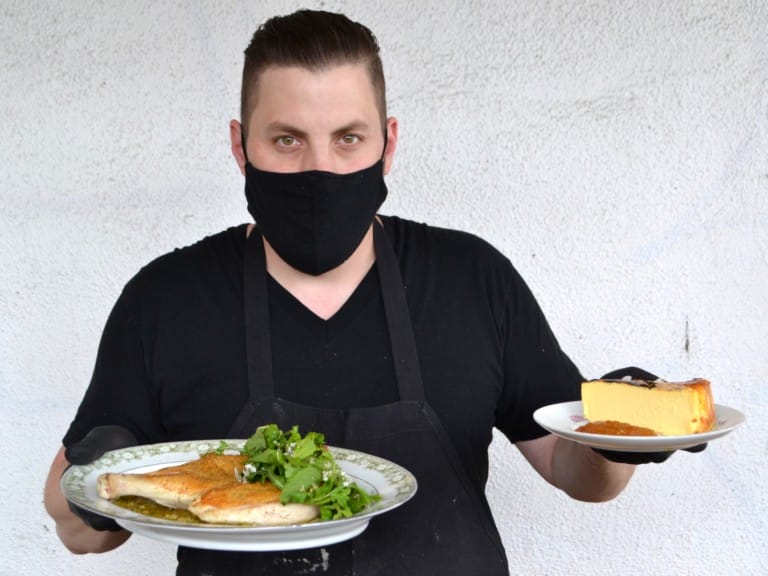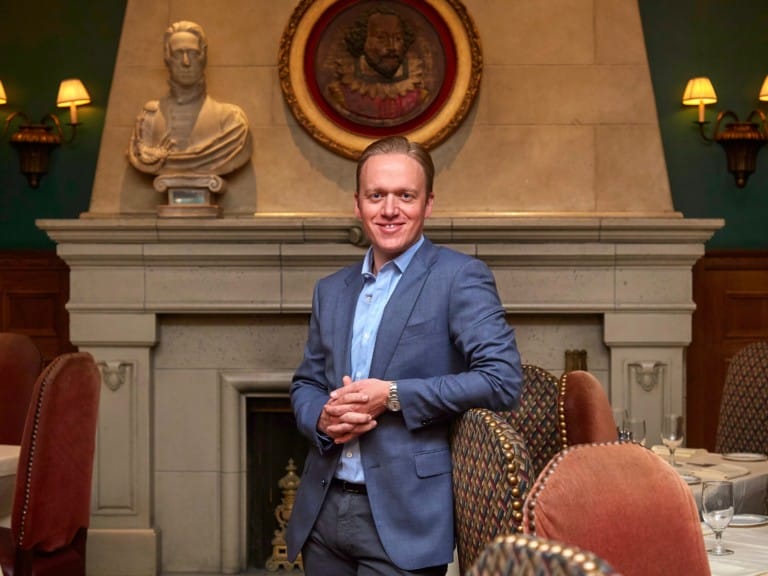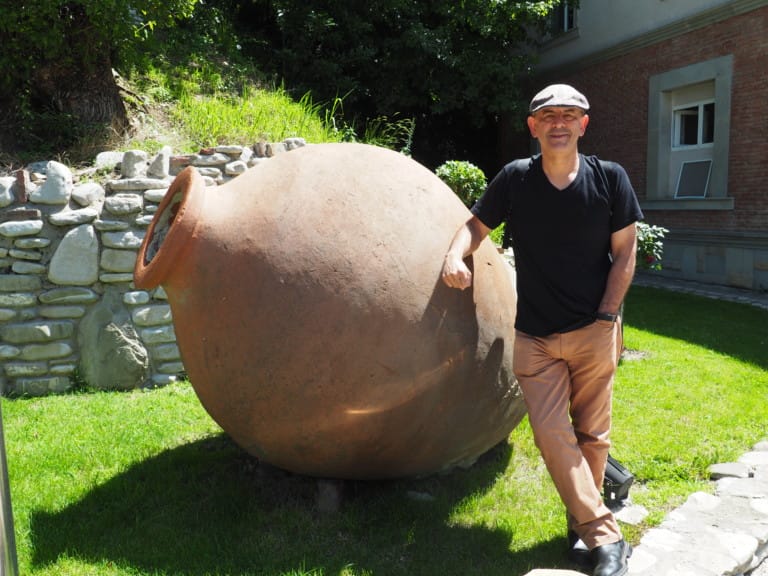Preeti Mistry was born in London, mainly raised in Ohio, and moved to San Francisco to study film at the New School of California. They soon became more interested in cooking and worked at restaurants in London and the Bay Area, eventually helming kitchens at the deYoung Museum in San Francisco and Google headquarters in Mountain View. They competed on “Top Chef” Season 6 before operating two influential East Bay restaurants with wife/partner Ann Nadeau: Juhu Beach Club in Oakland, which appeared on Anthony Bourdain’s TV show “Parts Unknown,” and Navi Kitchen in Emeryville. Mistry earned James Beard Foundation nominations in 2017 and 2018 for Best Chef: West. Their writing has also appeared in several top publications and in The Juhu Beach Club Cookbook: Indian Spice, Oakland Soul (2017). Mistry also hosts the “Loading Dock Talks” podcast, speaking with fellow social justice thought leaders in the food world. I met Mistry at “Shifting the Lens,” the inclusive dinner series at J Vineyards & Winery in Healdsburg where they made an impassioned speech about being proactive when saying, “Everyone’s welcome here.” We subsequently spoke by phone in late November about a range of important issues and initiatives.
JL: So you moved from Ohio to San Francisco to study film in the ’90s?
Technically, I had been living in Ann Arbor. I’ll give you the quick rundown. Born in London. Then we lived in Florida and in Pittsburgh for a little while, but then ended up in Toledo, Ohio, from basically eight to 18. You know, the formative years. Then I moved to Ann Arbor. I wasn’t in school there. I dropped out of college because I was going to a state school that I hated because my parents wouldn’t let me go to NYU, which I did get into. And then I met my wife, Ann. She had just graduated from the University of Michigan and was still working and living in Ann Arbor. Then we moved to San Francisco together in 1996.
JL: Did you end up studying film in San Francisco?
PM: Yeah, I studied film at New College. I actually made a short film. You can see it on YouTube. It’s four and a half minutes. It’s called “Junk Box Warrior.”
JL: Did you work in the entertainment industry in any capacity after that?
PM: Yeah, I worked for Frameline. They do the LGBT Film Festival in San Francisco, which is the largest LGBT film festival in the world. I worked for them after I graduated college for a few years and basically spent my time working there in the office, and then cooking all the time. So it started to become apparent that I had other passions.
JL: What motivated you to finally switch your focus from film to food?
PM: My wife Ann and I would do all these dinner parties with our friends and everyone really looked forward to when we threw a dinner party. This was the late ‘90s, so cooking wasn’t a thing the way it is today with young people. So it was kind of unique and it just came really easily to me. I just started cooking at home because I was sick of always eating out and I couldn’t really afford to eat anywhere fancy when I was 22 years old. So I just started cooking, because I missed home cooked food. Then we have these dinner parties and our friends would always just be like, “You should go to culinary school.” So I finally decided they were all right. And it just happened that for my wife Ann’s job, she had this opportunity to move to Europe. So it was also good timing, because I was like, “I don’t know where I’m going to get a job.” London is where we decided we were given options. And I wanted London because I speak English and I’m actually a British citizen still as well. I have dual citizenship. So that seemed more desirable than Copenhagen. I went to culinary school, so it was like the perfect time to make the switch.
JL: What was that first job that you got in London?
PM: After I finished school?
JL: Yes.
PM: It was a rocky path. This was, I guess, 20 years ago. In retrospect, I can now have a better vision of what the issues were. I think a lot of it really comes down to everything that we’ve sort of, you know, finally named in our industry in the last several years, which is just the racism, the sexism, the general toxicity of the environments. I feel like I kind of struggled to find a place that made sense for me. That place ended up being The Sugar Club in Soho. Basically, I was externing, staging at Claridge’s Hotel, not Gordon Ramsay’s restaurant in the same hotel, but the actual hotel, like banqueting and everything. From there, I tried to stage at different places and had a lot of really negative experiences, where I just was like, “I can’t work at this place.” Then the idea of The Sugar Club came along because I had actually eaten there when we first moved to London when a friend had come to visit, and I really liked the food there. I gave him a call and because back then you like literally just showed up, or you called the kitchen and there was like a kitchen phone. And you’re like, “Can I speak to the chef?” And then they’d put the chef on the phone. A phone on the wall. And I asked if I could stage and he said, “Yeah, but if you’re annoying, you know, I’m gonna kick you out of the kitchen.” I said, “Okay.” I really liked it there, and they really liked me. I was the only woman in the kitchen. The original chef was Peter Gordon. Then David Selex was the chef when I was there, who had been his sous chef and was amazing. He’s still a friend of mine. He’s back in Melbourne, Australia. So he’s Australian, and the owners were from New Zealand, so the food was sort of this Australian fine dining, sort of like a mixture of modern European with a lot of Asian influences. I was garde manger. We had a sashimi app, a kangaroo salad, and a Spanish tapas plate. Somehow it worked.
JL: How did you and Ann find your way back to the Bay Area?
PM: You know, London’s a big city and I love it. I love visiting and I loved living there, but I think we just started to miss the Bay Area, just all the things, whether it’s the overt gayness, the produce and farmers markets, the weather, our friends and family that we’ve grown close to, so we decided we wanted to move back. We stayed longer than we originally were supposed to. It was supposed to be just a year and we stayed for two and a half years. Almost three, because we wanted to give it a go. The moment we were finally finding a groove, we were like, “Wait, we have to go back in like two months?” No, we want to stay longer.” So we stayed longer, which was great because also being born there and leaving when I was five it was kind of an amazing thing to reconnect with the city.
JL: Was Juhu Beach Club the first restaurant that you opened with Ann?
PM: Yes.
JL: Okay. At this point, you’re either in-between restaurants or have moved on from restaurants to something else. We’ll get into that in a bit, but what is it that you miss most about running your own restaurants?
PM: I think I’m a very indecisive person. So there’s something very concrete about having your own brick and mortar restaurant. I wake up sometimes, and because I have sort of a number of different freelance jobs now, it’s sort of like, what am I doing today? What should I be doing today? Whereas in the restaurant, you just go there and the things present themselves. There’s something very clear, tactical, tangible… A lot of times when we first opened, I remember a couple times when Ann was out of town, and on a Monday, the restaurant’s closed, but I’d still just go there because I didn’t know what else to do with myself. Then you’re like, “Oh, well, this needs cleaning or reorganizing. Let me check on inventory.” It’s like, once I’m in that space, I know exactly what to do. And it feels very clear, as opposed to like my life now with a lot of different balls to juggle. I mean, the restaurant itself is a lot of balls, but they’re all in that space. And just having it more be this amorphous thing where you’re like, “Okay, what am I working on today? Am I writing that thing? Am I working? Am I following up on this email?” Actually, over the summer, it was kind of fun, because there were those crunch times with the J residency where it was like, “Okay, I just go there and I do the thing.” I think as I get older and work on different projects, it’s always more challenging for me to prioritize my day, but in the restaurant, it’s so tactical.
JL: At this point, considering you have other interests and other things to do in your career, can you imagine opening another restaurant? What would that even look like?









Leave a Comment